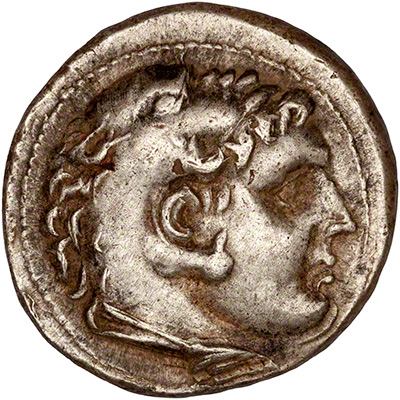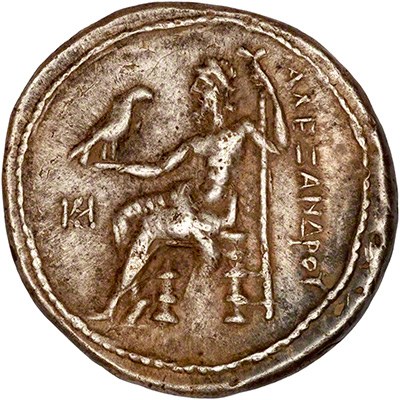| The Very Highest Quality Ancient Coins... |
| Tetradrachm of Alexander the Great |

|
|
|
|
|

|
|
|
Alexander the Great (336-323 B.C.)
One of the most famous figures of antiquity and a conqueror whose achievements rank alongside those of Julius Caesar, Napoleon Bonaparte and Ghengis Khan.
Alexander of Macedon was tutored by the famous philospher Aristotle. Alexander's father was Philip II, a great warrior king in his own right, who had united most of Greece under his rule and had been preparing to launch a war of conquest against the Persian Empire when he was assasinated in 336 B.C. whereupon Alexander assumed the mantle as King of Macedon and took command of his father's armies. Having secured his position by murdering several potential rival claimants to the throne and putting down several revolts by the Greek city-states, by 334 he was ready to embark upon his war of conquest against the Persian Empire. Having crossed the Hellespont with over 40,000 soldiers, Alexander drove the Persians out of Asia Minor and proclaimed himself 'King of Asia'.
In 333, Alexander advanced into Syria, and defeated Darius III's armies despite being outnumbered by nearly 3-1, and captured the Persian King's wife, mother and two daughters, as well as the huge treasury he had brought to the battlefield. After the battle, Darius III offered Alexander a ransom for his family of 10,000 silver talents (a talent being as much as a man could reasonably carry, or 26kg). However, Alexander had captured so much silver and other loot in his conquests that he was able to refuse this offer, and was able to use this to mint vast quantities of silver coins, including tetradrachmas such as the one illustrated, to pay his soldiers and other expenses comfortably.
The cruelty Alexander demonstrated when he was forced to capture a city by siege or assault meant that most cities in his path capitulated immediately upon hearing of his approach. In Egypt, he was viewed as a liberator, and he reciprocated by honouring their gods and relished in the titles they bestowed upon him, including 'Master of the Universe and 'Son of Amun'. He also founded the Egyptian city of Alexandria, which still bears his name to this day.
In 331, Alexander departed from Egypt and marched into Mesopatamia, defeating Darius at the Battle of Gugamela, before pushing on into Persia itself, capturing Persopolis, the capital of the Persian Empire. Darius III meanwhile, had been usurped and murdered by one of his vassals, Bessus. Alexander declared himself Darius' legitimate successor and attacked Bessus, who was eventually betrayed by one of his own Satraps.
By 329, the Persian Empire had been completely conquered, and Alexander continued his war of conquest into India. After winning several battles, Alexander continued to push further into India, until his army, sick of campaiging and fearing the huge armies which were said to dwarf those of Persia, revolted and refused to advance any further. Instead, Alexander turned South, conquering a few hill tribes before returning east back to Babylon, where he died in 323 B.C. at the age of 32.
Upon his death, Alexander's generals divided the Empire between themselves, known as the Diadochi (or 'successors'), they formed the successor states, chiefly the Ptolemaic Kingdom of Egypt (named after Ptolemy), the Selucid Empire (named for Seleucus Nicator) and the Kingdom of Pergamon, incorporating Macedon and Asia Minor. Alexander IV, the posthumus son of Alexander the Great, was murdered before he reached adulthood.
Alexander the Great's legacy was to spread Hellenistic, or greek culture, from Asia Minor in the North, to Egypt in the West and all the way to the borders of India. This legacy was to last all the way in to Roman times, when most of what was left of the successor kingdoms was finally conquered by the Roman Empire under Augustus, with the Parthian Empire (the Eastern portion of the now defunct Selucid Empire) remaining in existance until 224 A.D. when the Arsacids were displace by a dynasty that turned it into a resurgent Persian Empire.
The coins of Alexander the Great are extremely numerous, and many were minted from silver captured or mined in Alexander's vast Empire. Such was Alexander's reknown, that coins in his name were minted for centuries after his death. These are usually distinguishable from his lifetime issues by stylistic differences between those issued after his death, such as Zeus having crossed legs in posthumous issues, or the title of 'Basileus Alexander' (King Alexander), which was more often bestowed in later coins from years after his death than in earlier ones after his death.
Alexander the Great Tetradrachm
Obverse
Alexander in the style of Herakles (Hercules) with a lionskin head dress
Reverse
Zeus sitting upon a throne with 'Basileus Alexander' either side of him, holding a bird and sceptre
Price & Availability
| Description | Grade | Availability | Price £ | Price $ |
| Tetradrachm | No | £Ask | $Ask |
Postage & Packing:
UK: At buyer's Risk £3.50 or
Fully Insured £9 (Usually by Royal Mail Special Delivery)
USA: Airmail at buyer's risk $10 or
Fully Insured $20
For further details, please see our Postage & Packing page.
Order Form - UK
Order Form - USA
Order Form - EU
Order Form - Rest of World
Coins Wanted
We make an active market in almost all world coins, gold or otherwise, including Greek coins. If you have any of these coins to sell, please contact us, or post them to us for appraisal and offer.
| ...at the Lowest Possible Price |
|
32 - 36 Harrowside, Blackpool, Lancashire, FY4 1RJ, England. Telephone (44) - (0) 1253 - 343081 ; Fax 408058; E-mail: The URL for our main page is: https://24carat.co.uk Chard(1964) Ltd |